Episode 20: A Resilient, Independent and Green Europe with Heather Grabbe
As Europeans reckon once again with the challenges of war on their continent, has the pressing issue of climate change fallen by the wayside as governments have scrambled to contend with even more immediate concerns? How can the EU work toward greater independence and security while still reacting appropriately to the environmental threat of global warming? In this conversation Senior Advisor at Open Society Foundations and Europe's Futures fellow Heather Grabbe and Ivan Vejvoda explore the various angles on and approaches to this question from the generational shifts in attitudes toward climate policy and the march of technology to the green common ground that Europe can find with China.A regular contributor to the Financial Times, The New York Times, The Wall Street Journal, and The Guardian, Heather Grabbe was a senior advisor to the European Commissioner for Enlargement, Olli Rehn, where she was responsible for EU policy on the Balkans and Turkey. Prior to that, she was the deputy director of the Centre for European Reform and wrote extensively on EU external policies and enlargement. She was the long-term executive director of the Open Society European Policy Institute. She is currently a Senior Advisor to the leadership of Open Society Foundations. Grabbe has also conducted academic research at institutions such as the European University Institute, Chatham House, Oxford and Birmingham universities, and has taught at the London School of Economics.<br /><br />Find her on twitter @heathergrabbe<br />Read more about Heather at wikipediaIvan Vejvoda is Head of the Europe's Futures program at IWM where, in cooperation with leading European organisations and think tanks IWM and ERSTE Foundation have joined forces to tackle some of the most crucial topics: nexus of borders and migration, deterioration in rule of law and democracy and European Union’s enlargement prospects.<br /><br />The Institute for Human Sciences (IWM) is an independent institute for advanced study in the humanities and social sciences. Since its foundation in 1982, it has promoted intellectual exchange between East and West, between academia and society, and between a variety of disciplines and schools of thought. In this way, the IWM has become a vibrant center of intellectual life in Vienna.The IWM is a community of scholars pursuing advanced research in the humanities and social sciences. For nearly four decades, the Institute has promoted intellectual exchange across disciplines, between academia and society, and among regions of the world. It hosts more than a hundred fellows each year, organizes public exchanges, and publishes books, articles, and digital fora. you can find IWM's website at:https://www.iwm.at/

